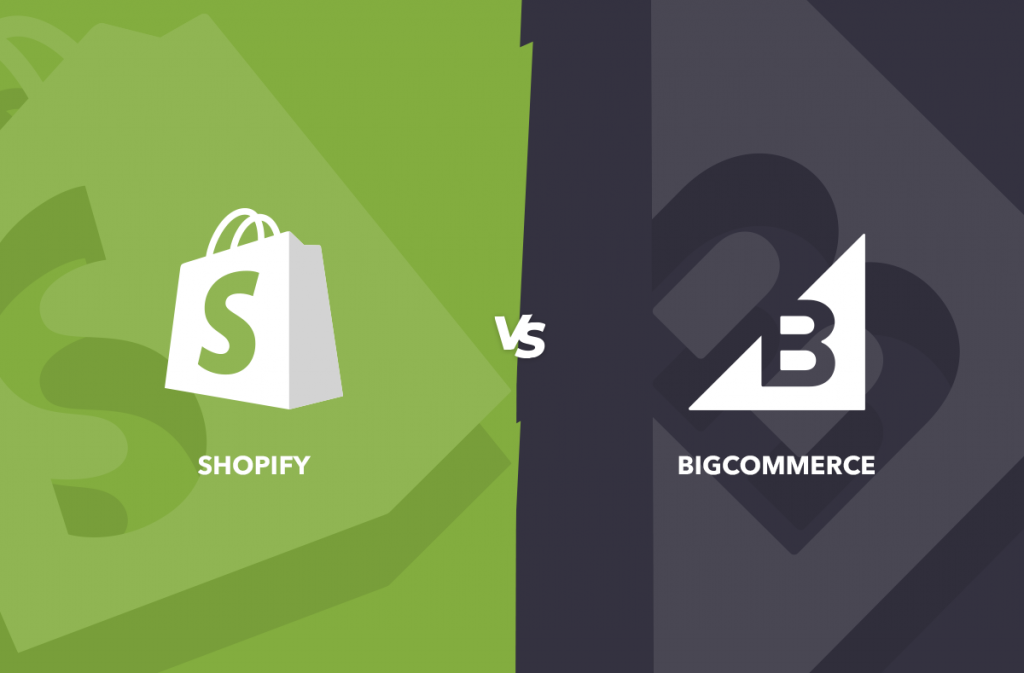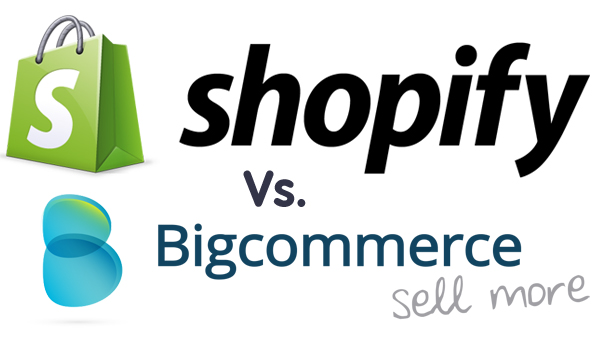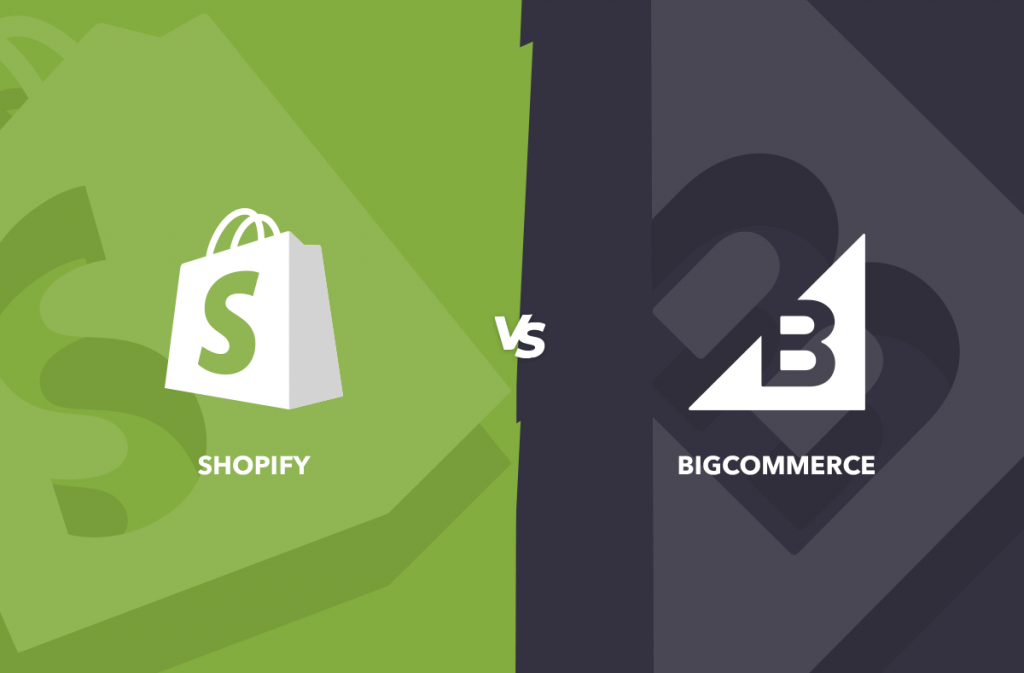
Shopify and BigCommerce are two of the most popular online shopping cart solutions on the market today. Despite their very similar features, they could not be more different. How do these two shopping cart solutions stack up against each other? What are the key differences between Shopify and BigCommerce?
This article will examine these questions and provide a point-by-point comparison of Shopify vs BigCommerce.
BigCommerce vs Shopify — brief overview
BigCommerce and Shopify are two eCommerce platforms that have solid reputations and are often used together by businesses of all sizes, from the smallest of startups to the most successful companies
Bigcommerce
BigCommerce is a low-cost, fully-hosted SaaS platform. Designed with the entrepreneur in mind, it offers the option to customize the experience with integrations and add-ons. It comes with an admin panel that lets you manage products, orders, and marketing tools. With a range of add-ons for your store, you can create your own bespoke experience.
It is a fully cloud-based platform that enables businesses to sell on multiple channels, including eBay, Google Shopping, Facebook, Pinterest, and Amazon. It helps vendors to sell a wide array of products: physical and digital items, services, subscriptions, and even tickets to events.
The company is completely open-source and has a comprehensive suite of integrated analytics. It also offers a range of marketing options, including SEO, PPC, email campaigns, and building a community. You can also use BigCommerce to build an online store, a blog, or even a membership site.
Shopify
Shopify is an eCommerce solution platform that can be used to create and run your online store. It provides merchants of all sizes with everything they need to start and run their eCommerce online store.
Shopify comes with an extensive list of features and integrations that make the hosting and development of an online store easy. Merchants can create their apps to help them work more efficiently, and Shopify has several apps that can be used to speed up the process.
If you don’t have a product to sell, you can use Shopify to start a drop-shipping business. To do this, you can search for a product and add it to your shop, instead of creating your ones.
Compare BigCommerce and Shopify features
Shopify and BigCommerce are two eCommerce platforms often used by the same businesses. Both platforms are exceptional in their unique ways. That's why we're going to compare these platforms side-by-side to help you choose the best one for your business.
Pricing
Both Shopify and BigCommerce pricing plans are cost-effective and affordable even if you are just starting your e-commerce business. You can also take advantage of a free trial version, without the need to attach your credit card (15 days from BigCommerce and 14 days from Shopify).
BigCommerce vs Shopify pricing comparison
|
BigCommerce |
Shopify |
|
|
Pricing plans |
Standard: $29.95/month Plus: $79.95/month Pro: $299.95/month Enterprise: Custom |
Basic: $29/month Standard: $79/month Advanced: $299/month Shopify Plus: Custom |
|
Transaction fees |
Doesn’t charge transaction fees, but you have to pay to your third-party payment provider: 2.9% + $0.3 (Standard) 2.2% + $0.3 (Pro) |
Charges transaction fees if you use a third-party payment provider. No transaction fee if you use Shopify payments, but charges a credit card fee. 0.5%-2% per transaction (for third-party providers) 2.9%+$0.3 (credit card fee on Basic plan) 2.4%+$0.3 (credit card fee on Advanced plan) |
Sales & inventory
Both providers offer the basic set of sales features: setting shipping locations, defining the cost of shipping based on the weight and order value, integrating with other shopping platforms (Facebook, Amazon, Pinterest, Instagram).
BigCommerce's inventory management system is designed to simplify the process of managing stock levels and understanding order trends, which means you can keep your business moving forward with less effort. It will help you to seamlessly integrate your online store with your physical store, monitor the stocks, and understand the sales trends.
Shopify also has a built-in inventory management tool that allows you to create inventory reports, search for inventory, and more. You will be able to track inventory, adjust inventory costs, view history, etc.
Marketing features
BigCommerce has more built-in marketing features, but Shopify offers a broader selection of integrations.
BigCommerce, unlike Shopify, offers more advanced marketing features of the platform, such as segmentation. Segmentation allows you to segment your target audience for greater marketing effectiveness by creating custom experiences for various audiences.
Shopify's basic plan provides you with a lot of insight into your product performance on Shopify. On this plan, you can see how specific products have been selling which can help you understand how to optimize your marketing for those products. However, this plan doesn't come with all the analytics that you might want. With the advanced plan, you'll be able to gain access to sales and profit reports.
SEO features
Shopify and BigCommerce SEO toolset is good enough for their customers to promote their e-commerce shop in SERP and receive organic traffic. The clients can add keywords, edit meta titles and descriptions, automatically create the robots.txt file, prevent page duplication through a canonical redirect.
To make your website based on BigCommerce or Shopify SEO-friendly, you need to organize your products into categories and subcategories. The first step to creating an SEO-friendly website is to take a look at your inventory and make sure that your products are grouped into categories and subcategories.
BigCommerce does this for you automatically and lets you fully customize the website URL. It is an advantage from the SEO point of view since it helps the search engine understand the structure of your website. With BigCommerce, you can use custom meta descriptions, Google search snippets, snippets in the URL, and other types of custom descriptions with your products.
Shopify’s approach to the website structure is different. Instead of categories and subcategories, Shopify groups your products into collections. From the SEO point of view, it is a disadvantage since there is a lack of breadcrumbs. Yet, you can organize your collection with the help of metadata which is more convenient for your users.

Design and customization
Both providers offer a pack of free themes: 9 from Shopify and 12 from BigCommerce. Shopify has a lower entry barrier, so even a beginner can create an attractive e-commerce website. Free themes are a great way for a starting business to cut costs, but more advanced entrepreneurs may feel limited by a free theme and prefer paid ones with a broader area for customization.
Shopify offers 70+ paid themes with a one-time fee from $100 to $180. There are specific themes for different industries, you can also search by color, layout, the number of products.
BigCommerce offers over 150 paid themes with a one-time fee from $150 to $300. There are also variations depending on the industry, catalog size, color, etc. Each theme has three variants of color schemes.
Payment gateway
When choosing a payment gateway for your online store, it can be hard to know which one to pick. Both platforms offer a variety of payment options, so you can pick the one that best fits your needs. Both of them support multiple currencies and allow integrating a POS terminal.
Shopify supports 70+ payment processing systems from all over the world. Shopify's payment processing system is powered by Stripe and you will be able to track your transactions, payments, and balance right in your Shopify admin panel. Yet, Shopify has 0,5%-2% transaction fees in case you are not using Shopify payments.
BigCommerce supports 40 payment processors but doesn’t charge transaction fees. BigCommerce as an agreement with PayPal to lower transaction fees (2.9%-2.5%-2.4%), compared to Shopify (2.9%-2.6%,-2.4%).
Ease of use
Shopify is one of the easiest e-commerce platforms to set up, while BigCommerce can be a bit harder to set up, it is easier to get a customer on.
Shopify is a great option for a new business, especially if you're just starting, as it is a platform that is very easy to set up and maintain. The platform is intuitive and easy to use and does not require a lot of technical knowledge.
The BigCommerce platform is more customizable and has more features than Shopify. Since BigCommerce is a self-hosted platform, it offers more customization options. However, it has a bit higher entry barrier than Shopify, and it might take more time to understand how to work with the platform if you are a newbie in e-commerce.
Integrations
BigCommerce offers almost 900 useful integrations in 20 categories, including B2B, wholesale, marketing, shipping, drop-shipping, etc. You can integrate your BigCommerce store with such famous services as MailChimp, QuickBooks, Amazon, Facebook Ads, etc.
At the same time, Shopify offers 4200+ applications to download. Yet, you need to remember that BigCommerce has more out-of-the-box features, while Shopify can charge fees for downloading a necessary app.
Support
Both BigCommerce and Shopify provide customer support services to their clients: phone support, live chat, and email-support, helpdesk, forum and community support, video tutorials, high-priority support for Enterprise users.
Once you set up a BigCommerce free trial, their team will offer you a 10-min intro call. The BigCommerce specialist will ask you several questions about your business and give some pieces of advice so that you could use their platform more efficiently.
Shopify’s helpdesk is more clear than BigCommerce’s one — it has various sections that are clearly separated. By requesting help within the editor, you will be directed to the necessary page of the Shopify helpdesk.
Security
E-commerce site security is a necessary component for any business that operates on the internet. It is important for many reasons, specifically when it comes to protecting the customers' privacy and business finance, preventing fraud and hacking.
A security breach may result in not only financial losses but also lead to losing the trust of the customers. To maximize the security of your e-commerce site, you need to find a way to make sure that it is properly protected.
Both BigCommerce and Shopify offer their customers to set up an SSL certificate when they enroll in their domain. It confirms that the website is encrypted, and the information exchange between the customer and the website is private.
So what to choose?
To review, BigCommerce and Shopify both offer a strong set of features and capabilities that are enough to run a successful e-commerce business. We have compared their major features, but there is still a question — which platform will suit better for your situation?
Shopify’s system is based on minimalism — there are fewer out-of-the-box templates and features. It is easier to use in case you are setting up your first e-commerce store. You can build your store with existing Shopify resources and then gradually strengthen it by adding new apps and integrations.
BigCommerce is a more advanced platform that offers more out-of-the-box features. It will suit you if you are developing an existing business and want more customization at the earliest stages.
Conclusion
We hope you enjoyed our comparison of Shopify and BigCommerce. Shopify and BigCommerce are products designed with the customer in mind, and they have very similar features. Their key differences lie in the amount of support each provides, the number of features each platform has, and customer feedback from each customer.
If you are considering BigCommerce or Shopify, take a close look at the key differences to see which would be a better option for your business. Please contact us if you have any questions or comments. We would love to hear from you!



